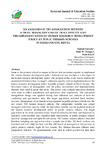AN ANALYSIS OF THE ASSOCIATION BETWEEN SCHOOL MANAGERS’S INDUCTION CAPACITY AND THE IMPLEMENTATION OF HUMAN RESOURCE DEVELOPMENT POLICY AT PUBLIC PRIMARY SCHOOLS IN NYERI COUNTY, KENYA

View/
Date
2018Author
Kaniaru, Samuel
Thinguri, Ruth W.
Koech, Peter Kibet
Metadata
Show full item recordAbstract
Some of the primary school managers in Kenya lack induction capacity to implement the human resource development policy. Induction of new teachers is a key aspect of the human resource development policy. The purpose of this study was to analyze the association between school manager’s induction capacity and the implementation of the human resource development policy in public primary schools in Nyeri County. The behavioral theory of management and the policy formulation and implementation theories were used to guide this study. The survey and in-depth interviews methods were used to collect quantitative and qualitative data respectively. The concurrent triangulation design was applied during data collection and analysis of both the qualitative and quantitative data. The target population included head teachers, teachers, chairpersons of the boards of management in public primary schools and the sub county TSC human resource officers. The independent variable was school manager’s induction capacity while the dependent variable was the implementation of the human resource development policy in public primary schools. The target population of the study consisted of four hundred (400) headteachers, one thousand six hundred (1600) teachers, four hundred (400) chairpersons of public primary schools board of management and eight (8) sub county TSC human resource officers. Stratified Random Sampling was applied to select a sample size of fifty (50) head teachers, one hundred and sixty (160) teachers and fifty (50) board of management chairpersons in public primary schools. Eight (8) Sub County TSC Human Resource Officers were purposively selected. The questionnaires were used to collect quantitative data from head teachers and teachers in the selected public primary schools. Additionally, interview schedules were used to collect qualitative data from chairpersons of the schools’ board of management and from the sub county TSC human resource officers. Validity was enhanced by piloting of instruments prior to collecting the final data. To enhance credibility, adjustments of the tools were done according to the opinion obtained from respondents of the piloting and the advice provided by supervisors. Interactive questioning was used to enhance dependability. Qualitative data was analyzed thematically. The Chi square was applied for analysis of inferential statistics. This was done with the help of SPSS program version 24. Qualitative data was compared with quantitative data at the final analysis. The reporting of the quantitative data included percentages, tables and charts while qualitative data was by the Chi square values, inferential statistics. The findings of the study revealed that school managers have positive attitude towards conducting induction in their respective schools and that there exist a policy on induction. However, the school managers were found to have little time to conduct induction owing to other responsibilities assigned. The researcher recommended that headteachers of public primary schools should be properly trained on the induction process to enhance induction of teachers in their schools. Additionally, the school managers should have a reduced workload and adequate finances to enable them to carry out the teacher’s induction role effectively.
Collections
- School of Education [203]
